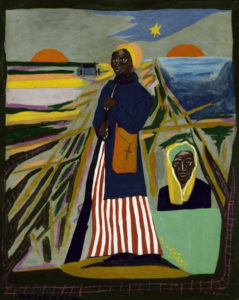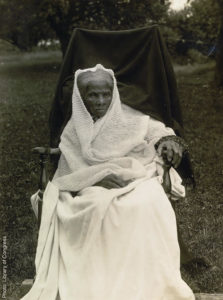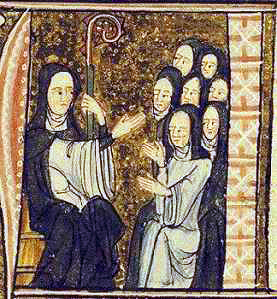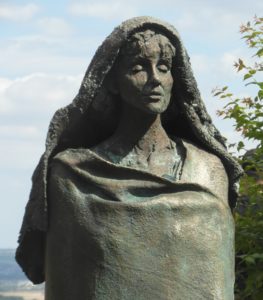Welcome to the Faithful Four! From an initial field of 32 saints, we are down to a holy four: Harriet Tubman, Hildegard of Bingen, Elizabeth Fry, and Joseph. In just a few short days, one of these saintly souls will be awarded the coveted Golden Halo.
To get to this point, Harriet took down Julie Billiart, James Solomon Russell, and Herman of Alaska, while Hildegard got past Romanos the Melodist, Elizabeth the New Martyr ,and Brother Lawrence. (note: click on the name of the vanquished saint to read that round's write-up)
Throughout Lent Madness, our saintly heroes have battled via basic bios, quirks and quotes, and event kitsch. In this round, we let our remaining Celebrity Bloggers loose as they answer the question “Why should Saint XX win the Golden Halo?” In other words, they’ve been charged with letting us know why their particular saint is so awesome. We have also invited them to share their two favorite images of their saints.
And as a side note, not that our wonderful Celebrity Bloggers are competing against each other per se, but this matchup does contain an interesting twist as our two newest Lent Madness contributors work to advance their respective saints. Both Sandra Montes and Miguel Escobar work at Union Theological Seminary in New York City, Sandra as Interim Worship Director and Miguel as Executive Director of Anglican Studies. Talk about in-house bragging rights!
Well, it's time to vote. Go do your thing!
Harriet Tubman
 When I was invited to write for Lent Madness I was so excited because I had been playing and watching along for years! When asked for my top ten saints, I immediately put Harriet Tubman as my first choice. I taught about Tubman when I was a teacher, I love reading about her and her tenacity, I also really enjoy hearing sermons about her. I remember one in particular preached at the Chapel of the Cross in NC and then presiding bishop-elect Curry, quoted Tubman, “If you hear the dogs, keep going. If you see the torches in the woods, keep going… Don’t give up, don’t give in… if you want to taste freedom, keep going!” I was “Amen-ing!” and “Mmhmm-ing!” And I thought to myself, I can’t, I won’t give up no matter what.
When I was invited to write for Lent Madness I was so excited because I had been playing and watching along for years! When asked for my top ten saints, I immediately put Harriet Tubman as my first choice. I taught about Tubman when I was a teacher, I love reading about her and her tenacity, I also really enjoy hearing sermons about her. I remember one in particular preached at the Chapel of the Cross in NC and then presiding bishop-elect Curry, quoted Tubman, “If you hear the dogs, keep going. If you see the torches in the woods, keep going… Don’t give up, don’t give in… if you want to taste freedom, keep going!” I was “Amen-ing!” and “Mmhmm-ing!” And I thought to myself, I can’t, I won’t give up no matter what.
Today, as I write this, I know Harriet is going against my wonderful friend Miguel Escobar’s saint, Hildegard, and I say to myself again, “No, I can’t give up!”
Harriet Tubman is an inspiration to any person who has felt in shackles. Any one of us who has ever looked to the heavens and begged, “Hear my cry!” feels hope and finds strength from Harriet’s story. Tubman saw visions and had dreams she interpreted as revelations from God that, I am certain, helped her continue to have strength, courage and intelligence to keep going, to keep helping and never give up.
She was born into slavery but decided that was not the path for her. She didn’t have to help others, but she chose to. She knew there was something more and went for it. What a testimony for any of us who are looked down upon or who are told we are not worthy to be of service or to have an amazing legacy. She couldn’t read or write but she was determined to be free. She was told no many times, but she kept at it.
knew there was something more and went for it. What a testimony for any of us who are looked down upon or who are told we are not worthy to be of service or to have an amazing legacy. She couldn’t read or write but she was determined to be free. She was told no many times, but she kept at it.
She not only helped many enslaved people be free, as Jesus does, she also helped as a cook and a nurse and even led an armed assault during the Civil War! As Frederick Douglass wrote, she “labored in a private way… in the night” and what she is now known for may “seem improbable.” And, it very well may be improbable for us to imagine, but as the Bible says, all things are possible if we believe and, we can do all things through Christ who gives us strength.
In this time of pandemic, of fear, of confusion, death and pain, let us remember God’s promises, as did Harriet. Let us keep going. Let us keep believing. Let us never give up.
Hildegard of Bingen
 Hildegard of Bignen’s morality play Ordo Virtutum, composed around 1151, is about the struggle for a human soul, Anima, between the Virtues and the Devil. Importantly, the Virtues’ parts are sung by female voices, and were likely first sung by the nuns at Hildegard’s abbey, but the Devil is voiced by a male and never sings. Instead, he yells. He grunts. His appeal is wrapped up in lies and brash loudness. The play is about a soul wavering between the appeal of the Virtues and that of the Devil’s shouting, a singular fact that makes Hildegard’s work and vision especially relevant today.
Hildegard of Bignen’s morality play Ordo Virtutum, composed around 1151, is about the struggle for a human soul, Anima, between the Virtues and the Devil. Importantly, the Virtues’ parts are sung by female voices, and were likely first sung by the nuns at Hildegard’s abbey, but the Devil is voiced by a male and never sings. Instead, he yells. He grunts. His appeal is wrapped up in lies and brash loudness. The play is about a soul wavering between the appeal of the Virtues and that of the Devil’s shouting, a singular fact that makes Hildegard’s work and vision especially relevant today.
For I believe that America’s soul is at risk today. Like Anima in Ordo Virtutum, we appear to be pushed and pulled between the quieter appeal of ancient Virtues and the Devil’s lies and bellowing. Further, I fear this is especially the case when it comes to global issues such as climate change as well as the COVID-19 pandemic. Whose voices are we to believe?
The reason why I am making a case for Hildegard of Bignen today - against my good friend Sandra Montes’ appeal for Harriet Tubman, no less - is 1) that this is what I signed up to do when I agreed to write for this project but also 2) because I believe people -- indeed, perhaps even creation itself -- is longing for a visionary who will help point a way beyond this quagmire. With the effects of climate change closing in, and a bellowing nationalism resulting in less international coordination rather than more, we desperately need examples of ancient wisdom who will radically transform our relationship to consumption, to creation, and to truth itself.
As I wrote in this post for Lent Madness, Hildegard of Bignen has special relevance for a humanity seeking pathways for reconnecting to God’s creation. Drawing on her experience of the German forest as well as the medicinal garden at her abbey, Hildegard famously observed that “the Earth sweats greeness” and laid out a visionary theology wherein she saw Christ as sent by God for the ‘greening’ of humanity. In this vision, God is the source of both our own and creation’s abundant flourishing. This was such a central part of her vision that in the morality play Ordo Virtutum, the struggle over Anima is about whether the human soul can become reconnected to the Creator. In Causae et Curae, Hildegard again draws from this well of thought by arguing that human health is analogous to a thriving garden in that both are the result of the knowledgeable tending by a gardener/healer.
As the global threats of climate change and COVID-19 make abundantly clear, we humans are interconnected and entirely dependent on being in a healthy relationship with God’s creation. Furthermore, there is no promised land to escape to; we’ve only one Earth and I believe we have a decreasing amount of time to radically reorient how we will exist in this world.
dependent on being in a healthy relationship with God’s creation. Furthermore, there is no promised land to escape to; we’ve only one Earth and I believe we have a decreasing amount of time to radically reorient how we will exist in this world.
Will we continue to listen to the loud bellowing of climate-change deniers, white nationalists, and isolationists whose primary appeal is the fantasy that we can blindly continue in our individualistic, hyper-consumerist, and exploitative culture? Or will we, at list, begin to listen to the quieter melodies of ancient virtues, rediscovering a simpler way and reconnecting with God and our creation? Hildegard’s mystical vision, her musical compositions, and her scientific insights from the 12th century may be just the saint we need to face today’s challenges.
[poll id="298"]
164 comments on “Harriet Tubman vs. Hildegard of Bingen”
Hildegard is our Harriet, encouraging us to care more about "this fragile Earth, our island home" and its inhabitants than our own fears and selfish desires.
Harriet Tubman is already enthroned in that astonishing photo. Does she look frail? Then you need to take a closer look, at a resolution that allows you to see her face. Look her in the eye before you vote for her or not, but do not for one second think you will ever be able to stand in her way when there is more at stake than our silly contest.
“In this time of pandemic, of fear, of confusion, death and pain, let us remember God’s promises, as did Harriet. Let us keep going. Let us keep believing. Let us never give up.”
I was torn between the two candidates but Sandra’s brilliant and incredibly moving essay decided me today. My vote is for Harriet and indirectly for Sandra. God bless you and all your endeavors. I will keep going, keep believing and, with God’s help, never give up. Thank you for the rallying prayer!
Go Hildy Go!
A very difficult choice indeed. Was I the only one who thought of Martha and Mary?
We need both of these if our beautiful planet and a compassionate world is to survive.
However I did grow up near the terminus of the Underground Railroad so I have to continue to love and admire Harriet as I have since I was a small child and heard of her amazing journey.
Harriet went back, again and again.
Miguel....there has been much "bellowing" on both sides of the aisle, I'd say. I agree with your question, "Which voices are we to believe?" But unfortunately for Hildegard, you tip your hand politically with name-calling in your last paragraph and therefore lost me--not because I support any of those causes--but because I think those descriptors are unfair. We all are looking for peace. Peace be with you.
I voted for each of these women in their preliminary rounds, so choosing between them was difficult. Hildegard has been a lifelong inspiration for me, but I was prepared to vote for Harriet. Miguel's thoughtful evocation of Hildegard's meaning for today's world shifted me back to Hildegard. Action or some sort of overarching, guiding ethos? Which do we need today?
Both of these women deserve their halos!
Ah! Two of my most highly regarded saintly role models! I had to go with Hildegard and the hope for our future mystical guidance.
Both deserve the Halo. Each a visionary and each a fighter for the right, in their own and our times.
Biblical religion is inseparable from both freedom and the soul's desire for an experience of the divine. Neither is of lesser importance. For many of us music has been a frame for direct experience of divine love and grace, and that is why I voted for Hildegard. I will quote Father J.F. Weber (in Fanfare Magazine dated Jan 1983) on Hildegard:
"Hildegard's life was unusually full for a woman of her time. In a gesture typical of the times, her noble parents dedicated her, their tenth child, to religious life, so at the age of 8 she was entrusted to the care of a nun in a convent. She grew up, professed her vows, and at 35 became abbess of the convent, later moving to a ruined abbey to establish a new convent. [While] the process of canonization was never completed in Rome, that formality was not essential at the time and she is generally venerated as a saint. She was widely known and exercised some influence with leaders of church and state. Her claim to sanctity, however, was the depth of her religious experiences as indicated by her mystical visions and writings. She was also a composer. One form that was used extensively in this period was the Sequence, a verse composition which followed the Alleluia of the Mass; Hildegard wrote 7 of them."
Hildegard von Bingen has had such a profound impact upon my personal life that there is no choice for me here, despite Harriet Tubman's valor and holiness. Years ago, when I was lost in the depths of a dark night of the soul, a chance hearing of Hildegard's music on NPR became the rope by which I began to climb out of the abyss and back into the light. I am a playwright, and fascinated by the woman behind the music, I wrote a play about her, The Wisdom of Serpents. In 2010, it was presented as the closing event for Northwestern University's summer-long celebration of Hildegard. During the performance's intermission, I was introduced to the man who would become my husband. Less than a year later, we were married--through no conscious decision of our own--on Hildegard's feast day. Seriously, it was the only date where all impediments to our ceremony melted away as if by saintly intervention. On our fifth wedding anniversary, we journeyed to Germany to take part in her feast day celebration and found our bonds with her renewed. As I write this, I am gazing at a picture of her; my husband, down the hall in his makeshift home office, has a statue of her on his desk. Every day, we are reminded of how Saint Hildegard utterly changed the lives of two lonely souls.
What an amazing story. Thanks for sharing. Worthy of NPR's "The Moth." Mazel tov!
Thank you so much. Stay safe; stay strong.
It is sad to see, especially in this time of national crisis, to see a "Celebrity Blogger" use the Lent Madness forum to make a political statement.
It is life in this time. Our life is greatly impacted by politics one way or the other. Our faith is a great influence on ours l ives as well. We can't separate one from the other--another trinity. Nor should we try.
I 'm not looking for quarrel. I'm just curious. Would you make the same comment if the blog had leaned to the right and not to the left?
Yes indeed!
Miguel called out by name white nationalism and climate denialism, both evils of our time. Are you acknowledging that white supremacy and anti-science ideology belong to the political right? That would undermine the "both-sidesism" of a previous post, which, ironically, seems to be declaring a vote for a black woman out of pique with his calling racism racism. I'm just curious, as you are directly positing "two sides" by name. It seems to me the voice of prophetic witness is well able to--and must--look political realities in the eye and name them. I recommend Martin King's letter from the jail in Birmingham, Alabama, surely one of the most powerful rhetorical documents in American letters. His grossest disappointment, he says (and I'm paraphrasing somewhat), is with those people who posit "both sides" as if there were some kind of equity between them, when there is no equity. Thank you for your post and for calling the "two sides" by name thereby making it possible for us to look openly at the naked lack of equity and equivalence between the "two sides." Until we can do that, there is no justice, and people will continue to pretend injury at any mention of "the political," as if someone had indelicately remarked that women had legs. I have been walking away from these posts, but people are dying, and "one side" denigrates science and democracy, whereas the other--doesn't. Prophetic witness means looking at reality, and perceiving whose image that ugliness reflects (Mark 12:16).
I think your response is directed at me:) I really am curious if you are a bishop, a church leader, someone I know! I am not asking. Please do remain anonymous. But I have wondered who you are for a couple years. As I said in my first comment, I vote for the PERSON up for vote and not for their significance in our lives today. I didn't mean to stir up a hornet's nest.
I have wondered about St Celia, too. We are always in trouble in a discussion when one side starts quoting scripture. Im sure many of us could quote scripture, Christian writers, early Christians writers, and church history right along with you. I might be wrong, but I don’t believe that’s the spirit of LM. Next year, I’m reading NO comments. Unfortunately, that means I will miss out on some rich personal sharing.
Thank you St.Celia.
We are Christians - scripture is central to our faith and practice.
In the end I voted for Harriet, but whoever wrote the biography for Hildegard did an incredible job. Had Hildegard been going against anyone else, the write up alone would have gotten my vote.
Lots of comments I went with Harriet Tubman
Wonderful way to get acquainted with the saint up-front and personal. I, too, was a Tubman rooter but swayed to Hildegard. She was also a composer.
All respect for Harriet, but have to go Hildegard! We need green! We need spring! We need nature! We need divine healing! We need to connect all of this! Hildegard is the saint of this moment in time - Viriditas!
This is the hardest decision yet. It is 6:31 p.m. and I still haven't voted. What makes many of the choices so hard is that saints are all so different. The other day I read this, in "Mere Christianity" by a past winner of the Golden Halo, C. S. Lewis: "Until you have given up your self to Him you will not have a real self. Sameness is to be found most among the most 'natural' men, not among those who surrender to Christ. How monotonously alike all the great tyrants and conquerors have been: how gloriously different are the saints." Maybe I'll have to toss a coin to see which of these women, gloriously different from each other, gets my vote.
C.S. Lewis' notion of the real self is one of his brilliant insights. When he says "how gloriously different are the saints" I would also include in their number scholars/scientists and artists, people who also "surrender" to something beyond themselves.
This was indeed the most difficult choice yet. Like many of you I was sure that my vote would go to Harriet. Both bloggers did a superb job indeed. After much consideration (and along phone call with my son which served as a distraction for a bit) I have cast my vote for Hidegard - agreeing that we could do with a visionary these days. And yet - we could use the stick-to-it-ness and continuing on of Harriet. But it is possible to vote for only one!
Sorry, Hildy. Freedom wins today.
Quoting scripture is a fatal blow in an argument. No more comments for me; I can’t handle such certitude on either side. I also believe Holy pWeek was not the place and time for us to hear the writer’s anger toward a political party.
I agree. Quoting scripture is a fatal blow in an argument. No more comments for me; I can’t handle such certitude on either side. I also believe Holy pWeek was not the place and time for us to hear the writer’s anger toward a political party.
Agreed. I voted for Harriet because I couldn't NOT vote for Harriet. Hers was a courage that I can never equal. Her life was unimaginably hard and dangerous, but she never gave up. Hildegard wrote music that brings me great joy, and her spirituality is exemplary, , but Harriet inspires me to be a better, braver, more loving human being.
I expected Harriet to win today, but Miguel's write up for Hildegard was so powerful that I am pleased to see the voting is closer than I expected. I am also somewhat amused by the distinction that people are making between activism and mysticism. Hildegard may have a mystical bent but her political skills and leadership of her community testify to great strengths as an activist. My vote goes to Hildegard for the breadth of her vision, and because we need her insights so much today as we face the environmental challenges and divisive nationalisms that are taking hold around the world.
My vote is for Harriet because the community in which I live was part of the underground railroad.
Miguel, I agree with your thoughts on Hildegard's modern relevance and thank you for the insights on Ordo Virtutum. I have learned something important today.